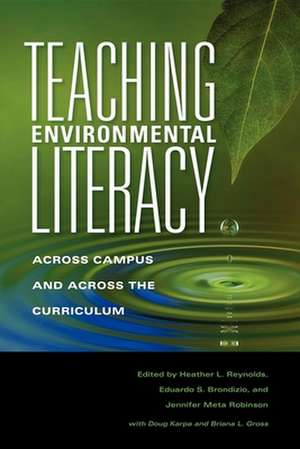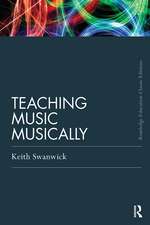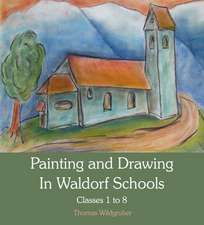Teaching Environmental Literacy – Across Campus and Across the Curriculum: Scholarship of Teaching and Learning
Autor Heather L. Reynolds, Eduardo S. Brondizio, Jennifer Meta Robinsonen Limba Engleză Paperback – 10 ian 2010
Preț: 177.37 lei
Nou
Puncte Express: 266
Preț estimativ în valută:
33.94€ • 35.31$ • 28.02£
33.94€ • 35.31$ • 28.02£
Carte tipărită la comandă
Livrare economică 12-26 aprilie
Preluare comenzi: 021 569.72.76
Specificații
ISBN-13: 9780253221506
ISBN-10: 0253221501
Pagini: 240
Dimensiuni: 152 x 227 x 16 mm
Greutate: 0.36 kg
Editura: MH – Indiana University Press
Seria Scholarship of Teaching and Learning
Locul publicării:United States
ISBN-10: 0253221501
Pagini: 240
Dimensiuni: 152 x 227 x 16 mm
Greutate: 0.36 kg
Editura: MH – Indiana University Press
Seria Scholarship of Teaching and Learning
Locul publicării:United States
Cuprins
Foreword; AcknowledgmentsIntroduction: The Rationale for Teaching Environmental Literacy in Higher Education / Heather L. Reynolds, Eduardo S. Brondizio, Jennifer Meta Robinson, Doug Karpa, and Briana L. GrossPart 1. A Model for Grassroots, Multidisciplinary Faculty Inquiry / Jennifer Meta Robinson and Heather L. ReynoldsPart 2. Core Learning Goals for Campus-wide Environmental LiteracyOverview / Heather L. Reynolds (Biology); 1. At the Forests Edge: A Place-Based Approach to Teaching Ecosystem Services / Keith M. Vogelsang and Eric J. Baack (Biology); 2. Population, Energy, and Sustainability / Bennet B. Brabson (Physics); 3. Population, Consumption, and Environment / Emilio F. Moran (Anthropology); 4. Economics and Sustainability / Christine Glaser (Economics); 5. A Sense of Place / Scott Russell Sanders (English); 6. Environmental Justice and a Sense of Place / John Applegate (Law); 7. Environmental Literacy and the Lifelong Cultivation of Wonder / Lisa H. Sideris (Religious Studies); 8. Teaching Environmental Communication Through Rhetorical Controversy / Phaedra C. Pezzullo (Communication and Culture)Part 3. Strategies for Teaching Environmental Literacy: Beyond the Traditional Classroom Overview / Doug Karpa (Instructional Development); 9. Effective Education for Environmental Literacy / Craig E. Nelson (Biology); 10. Learning in Place: The Campus as Ecosystem / James H. Capshew (History and Philosophy of Science); 11. Environmental Literacy and Service-Learning: A Multi-Text Rendering / Nicole Schonemann, Andrew Libby, and Claire King (Office of Service-Learning); 12. Sense of Place and the Physical Senses in Outdoor Environmental Learning / Matthew R. Auer (Public and Environmental Affairs); 13. A Natural Environment for Environmental Literacy / Keith Clay (Biology); 14. Teaching Outdoors / Vicky J. Meretsky (Public and Environmental Affairs)Part 4. Beyond Courses: Teaching Environmental Literacy across Campus and across the CurriculumOverview / Jennifer Meta Robinson (Communication and Culture); 15. Environmental Literacy and the Curriculum--An Administrative Perspective / Catherine Larson (Spanish and Portuguese); 16. Faculty, Staff, and Student Partnerships for Environmental Literacy and Sustainability / Briana L. Gross (Biology); 17. Food for Thought: A Multidisciplinary Faculty Grass-Roots Initiative for Sustainability and Service Learning / Whitney Schlegel (Human Biology), Heather L. Reynolds (Biology), Victoria M. Getty (Health, Physical Education and Recreation), Diane Henshel (Public and Environmental Affairs), and James W. Reidhaar (Fine Arts)Conclusion / Eduardo S. Brondizio (Anthropology)List of Contributors; Index
Recenzii
"Even as interconnected environmental, social, and economic problems have become increasingly prominent in public discourse, the training people receive to understand and address such concerns has lagged behind. Thirty-odd years after the first Earth Day, for example, only one-third of Americans can pass basic tests of environmental knowledge with grades of C or better . . . ." --from the introduction
"This collection is an invaluable resource for developing integrated, campus-wide programs to prepare students to think critically about, and to work to create, a sustainable society." --Abstracts of Public Administration, Development, and Environment, 2010
"This collection is an invaluable resource for developing integrated, campus-wide programs to prepare students to think critically about, and to work to create, a sustainable society." --Abstracts of Public Administration, Development, and Environment, 2010
Notă biografică
Heather L. Reynolds is Associate Professor of Biology at Indiana University Bloomington.
Eduardo S. Brondizio is Professor of Anthropology at Indiana University Bloomington.
Jennifer Meta Robinson is Senior Lecturer in the Department of Communication and Culture at Indiana University Bloomington and former Director of Campus Instructional Consulting. She is author (with J. A. Hartenfeld) of The Farmers' Market Book: Growing Food, Cultivating Community (IUP, 2007).
Descriere
Integrating environmental education throughout the curriculum





















